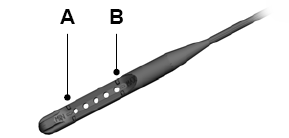Ford Escape: Automatic Transmission / Automatic Transmission Positions
Park (P)
This position locks the driveline and prevents the wheels from turning. The engine can start with the shifter in this position.
The electric parking brake could apply if:
- You shift to park (P) on a slope.
- You shift to park (P) without the brake pedal fully pressed.
Note: A warning tone sounds if you open the driver door and you have not shifted the transmission selector to park (P).
Reverse (R)
This position allows your vehicle to move backward. Come to a complete stop before shifting into and out of reverse (R).
Neutral (N)
WARNING: In neutral (N) your vehicle has the ability to roll freely. If you intend to leave your vehicle, make sure you apply the parking brake.
This position allows your vehicle to roll freely. Hold the brake pedal down when in this position.
The engine can start with the shifter in this position.
Drive (D)
This position, drive (D), is the normal driving position, and allows your vehicle to move forward.
Low (L)
This mode is for driving on steep slopes. The transmission will hold low gear for maximum torque driving uphill and maximum engine braking driving downhill. You can enter this mode at any vehicle speed.
Note: Prolonged use of this mode could lower fuel economy. With your vehicle in drive (D), press the L button to enter this mode.
 Automatic Transmission
Automatic Transmission
Automatic Transmission Precautions
WARNING: When your vehicle is
stationary, keep the brake pedal fully
pressed when shifting gears. Failure to
follow this instruction could result in
personal injury, death or property
damage...
 Shifting Your Vehicle Into Gear. Automatic Transmission Position Indicators
Shifting Your Vehicle Into Gear. Automatic Transmission Position Indicators
Shifting Your Vehicle Into Gear
Your vehicle has an electronic transmission
selector. The transmission selector is on
the center console. The gears are selected
by rotating the transmission selector to
PRNDL...
Other information:
Ford Escape 2020-2026 Service Manual: Diagnosis and Testing - Intake Air Pressure and Temperature
Diagnostic Trouble Code (DTC) Chart Diagnostics in this manual assume a certain skill level and knowledge of Ford-specific diagnostic practices.REFER to: Diagnostic Methods (100-00 General Information, Description and Operation). Module DTC Description Action PCM P007A:00 Charge Air Cooler Temperature Sensor Circuit (Bank 1): No Sub Type Information GO to Pinpoint Test DN P..
Ford Escape 2020-2026 Service Manual: Removal and Installation - Rear Door Window Regulator Motor
Removal NOTE: Left hand (LH) shown, right hand (RH) similar. NOTE: For rear door window regulator motors that are non-functional it may be necessary to remove the rear door window regulator motor prior to securing the rear door window glass. Remove the rear door trim panel. Refer to: Rear Door Trim Panel (501-05 Interior Trim and Ornamentation, Removal and Installation). ..
Categories
- Manuals Home
- 4th Generation Ford Escape Owners Manual
- 4th Generation Ford Escape Service Manual
- Child Safety Locks
- Removal and Installation - All-Wheel Drive (AWD) Module - 1.5L EcoBoost (132kW/180PS) – I3 (Y1)/2.0L EcoBoost (177kW/240PS) – MI4
- Accessing the Trip Computer. Resetting the Trip Computer
- New on site
- Most important about car
Engine Oil
Engine Oil Dipstick Overview

